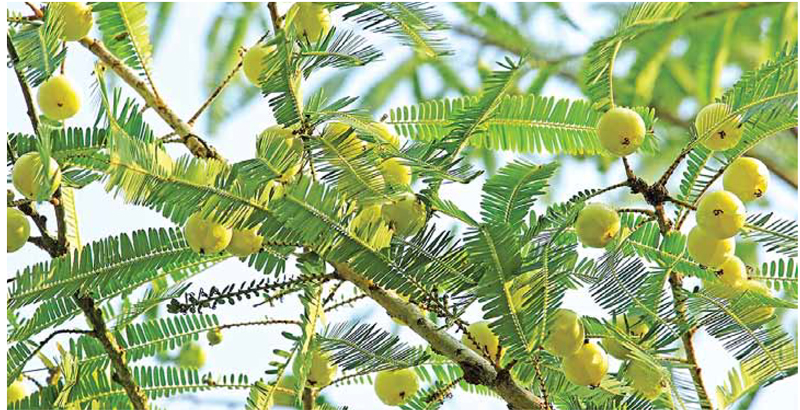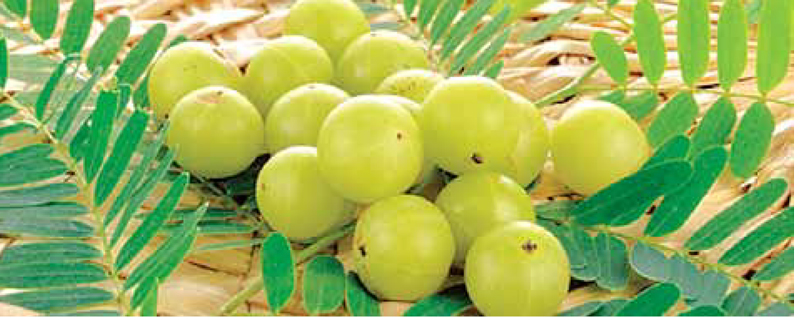
Amla/Anwla/Indian Gooseberry/Phyllanthus Emblica
By R K Nigam
Amla/Amalaki is a highly potent medicinal deciduous plant for its innumerable healing properties. The Amla tree is medium sized, about 10 feet to 20 feet in height. Amla is native to India and it is grown in different tropical and subtropical regions. It is also known as Indian gooseberry and is loaded with sufficient amount of nutrients and is the richest natural source of Vitamin C. Amla is one of the main ingredients in most Ayurvedic medicines, Chawanprash and herbal tonic are examples of such medicines due to presence of powerful Antioxidant properties.
Properties of Amla
- Some Ayurvedic properties of Amla are Rasa/Taste–Sour taste/Madhur, katu, Tikta and kashaya; After Taste/ Anu-rasa–Madhur; Guna/Quality–Heavy, dry, cool; Potency/Virya– Sheet/Cold; Vipaka–Madhur; Prabhav /Therapeutic effect–Rejuvenation; Karma /Dosha–Amla pacifies mainly Pitta, but it also balances the Kapha and Vata; Beneficial organs–stomach, intestine, heart, blood vessels, pancreas, liver and works as a good immunity booster .
- Ayurveda suggests consuming Amla daily to boost immunity and improve metabolism. Amla contains five tastes Sour, Sweet, Bitter, Pungent and Astringent that help to improve the functions of our body and mind effectively, improving memory, preventing cancer, fight against infection and inflammation
- Amla fruit has Anti-pyretic, analgesic, anti-atherogenic, apoptogenic, diuretic, cardio-protective, gastro-protective, anti-anemic, wound-healing, anti-diarrheal, hepato-protective, nephro-protective, digestivestimulants, anti-microbial, mildlaxative, carminative, anti-hypertensive, anti-diabetic and anti-oxidant properties Amla fruit possesses spasmolytic (relieves cramps and spasm), expectorant and hypoglycemic properties also.
- Amla helps manages indigestion by improving the Pachakagni (digestive fire) and it also helps in easy expulsion of stool due to rechan (laxative) property. Amla helps in weight control also by improving the metabolism due to its deepan (appetizer) and Pachan (digestive) properties.
- Amla helps to minimize the damage of stomach lining by increasing mucin, which protects the inner side of gastrointestinal tract. Gallic acid of Amla fruit protects the mucosal lining of stomach and may also help in ulcer healing and minimizing the side-effect of other medicine.
- Amla acts as a natural antacid and provides relief from the symptoms of gastritis. It controls the production of acid in the stomach and reduces abdominal pain, nausea, vomiting and heartburn caused by hyperacidity. The fiber of Amla reduces digestive problem because it increases the action of gastric juices for decomposition of food. Thus, it is also useful to relieve stomach heaviness and gases
- Amla is anti-anemic fruit with rich amount of Iron mineral and vitamin C. High level of vitamin C in Amla fruit may help our body absorb other nutrients like Iron, and other mineral supplements. Amla is basically alkaline in nature, which helps to balance the stomach acid levels and make the gut alkaline (helpful in reducing acidity). It is also a powerful food for brain that nourishes the mind and may help to improve memory power .
- Amla contains powerful anti-hyperglycemic properties, which is used in the treatment and management of diabetes by improving the glucose metabolism, thereby reducing blood sugar levels in the body. Soluble fiber in Amla dissolves quickly in the body, which helps to slow the rate at which the body absorbs sugar. Amla fruit helps insulin resistance and balances high blood sugar levels. It eliminates toxins from the body and heals cellular metabolism, which makes it useful for diabetes.
- A research paper shows that Amla fruit extract increases the secretion of insulin from pancreatic beta-cells, which further helps to minimize blood sugar level. Amla fruit also has a positive effect on blood glucose and lipid counts in type 2 diabetes people. It prevents sudden increase in blood glucose levels after food and delays the digestion of glucose.
- Amla may be helpful in maintaining bad cholesterol (LDL) and the level of good cholesterol (HDL) due to its antioxidant properties. It can reduce the accumulation of fats in arteries and veins, which may be lowering the risk of getting atherosclerosis and promoting healthy circulation along with overall cardiovascular health.
- Vitamin C of Amla fruit (if consuming Amla fruit regularly) promotes hair growth, improves hair health and fights against free radicals. Strong antioxidant, healing and rejuvenating properties of Amla fruit help in improving hair quality, increasing the scalp blood circulation and stimulating healthy hair growth. It prevents hair damage and premature graying also. The vitamin C of Amla produces collagen protein, which helps in stimulating hair growth.
- Vitamin C of Amla fight against bacteria, which guards the eyes against conjunctivitis and other eye infections like tear formation, redness, burning, itching etc. Consuming Amla fruit regularly helps in improving vision health and it makes the eyes muscles stronger, provides relaxation to the eyes. Tannins in Amla help to manage diabetic cataract and also prevent loss of vision by reducing fluid pressure in the eyes.
- Jaundice occurs due to an imbalance of Pitta dosha, which leads to weak liver function. Amla helps to improve liver function due to its Pitta balancing and rejuvenating properties. By consuming regularly Amla fruits helps in removing toxins from liver and kidney due to its antioxidant properties, which improve liver function.
- Overconsumption of Paracetamol causes damage to the liver. Amla prevents the damage of liver cells, because it fights against free radicals due to presence of high antioxidant properties (due to the presence of natural antioxidants such as Tannins, Flavonoids and vitamins). Amla also reduces inflammation of liver by lowering the level of inflammatory mediators and liver enzyme.
- Amla has very rich amount of Vitamin C and Polyphenols, which are potent anti-oxidants. 100 ml Amla juice contains about 480mg Vitamin C. Combination of Vitamin C and Polyphenols helps to fight against oxidative stress, stimulates the immune system and keeps disease and disorder at bay
- Amla fruits contain rich amount of Vitamin C, which is a strong powerful anti-oxidant and a good immunity booster. Vitamin C helps in enhancing the antibodies response and white blood cell function. Amla is one of the important components in Chyawanprash that has immunity boosting properties, digestive and liver protective action.
- Amla has strong anti-oxidant properties and helps combat free radicals.(Anti-oxidants are substances that can prevent or slow damage to cells caused by free radicals). Free radicals are unstable ions in the body, responsible for ageing and cell degeneration. Amla stabilizes these free radicals and protects our body. Amla is also a powerful rejuvenating agent for the body.

Chemical Properties of Amla
- Amla fruits contain rich amount of Ascorbic acid/Vitamin C and have bitter taste derived from (Hydrolysable Tannins) Ellagitannins such as Emblicanin A, Emblicanin B ( both Emblicanin A and B have Antioxidant properties), Punigluconin (punigluconin is an Ellagitannin, which exhibits anti-inflammatory, Anti-microbial activity), and pedunculagin (pedunculagin is also ellagitannin , which has antioxidant and anti-inflammatory bioactivity). Vitamin C of Amla fruits is essential for boosting immunity and keeping the body healthy
- Ellagitannins are a type of bioactive-Polyphenol (adiverse class of hydrolysable tannins). Polyphenols are compounds that are packed with snti-oxidants and potential health benefits.Polyphenols improve or help treat digestion issues, weight management, diabetes and cardiovascular disease. Ellagitannins and their metabolites exhibits numerous beneficial effects human health including anti-inflammatory, antioxidant, pre-biotic and Cardio-protective properties.
- Amla fruits have other active constituents, which are; Alkaloids- (Phyllantine, phyllemblin, Phyllantidine ); Vitamins C (Ascorbic acid); Amino acids (Glutamic acid, Proline, Aspartic acid, Lysine); Carbohydrates (pectin), Flavonoids (Kaempferol, Quercetin); Organic acid (Citric acid).
- Generally anti-oxidant properties of Amla are due to the presence of compounds like Vitamin C, Polyphenols, Quercetin, Kaempferol, Isocorilaginn, Gallic acid and Ellagic acid. Polyphenols of Amla have properties, which are known to protect our body from oxidative stress caused by high blood sugar levels.
- Ascorbic acid (Vitamin C) is necessary for the growth, development and repair of all body tissues and it is involved in the formation of collagen, absorption of Iron, proper functioning of the immune system, wound healing etc. Vitamin C is also a powerful scavenger of free radicals which cause cell damage leading to several disease including cataract, heart problem, diabetes, and ageing. It can increase the pH levels in our stomach and may trigger hyperacidity for those who are suffering from it.
- Glutamic acid (Amino acid) supports good health of immune system, digestive system and also aids in the energy production in the body. It is an amino acid used by the body to build protein and stimulating neurotransmitter in the central nervous system. Function of Proline include helping from collagen, regenerating cartilage, forming connecting tissue, repairing skin damage and wound and healing gut lining. Aspartic acid is a type of Amino acid, which plays a role in hormone production and its release. It also balances normal nervous system function. Lysine is an essential Amino acid which prevent cold sores to minimize anxiety and promote wound healing with numerous other benefits.
- Kaempferolis a naturally occurring flavonols (flavonoids), a strong antioxidant and helps to minimize the risk of chronic disease and it augments human body’s antioxidant defense against free radicals. Quercetin has antioxidant and anti-inflammatory effect which helps to reduce inflammation, control blood sugar and prevent heart problems. Function of Gallic acid (is a natural anti-oxidant and secondary polyphenolic metabolite) and methyl gallate (phenolic compound), include antioxidant, anti-inflammatory and anti neoplastic properties
- The Amla fruit is rich in Vitamin C and contains several bioactive Phytochemicals, of which majority are of Polyphenols (Ellagic acid, Chebulinic acid, Chebulagic acid, Leutolinetc). Ellagic acid is a natural phenol antioxidant, it helps to remove toxins from the body and protect against harmful molecules and free radicals. Chebulinic acid has property to remove toxin and unwanted fat from the body and acts as an effective antibacterial and antifungal agent.
- Anti-diabetic property of Amla fruit is due to the presence of strong antioxidant, Gallic acid, Gallotannin, Ellaic acid and Corilagin. These compound contain powerful anti-oxidant and free radicals scavenging properties that reduce oxidative stress in pancreas and help to normalize blood sugar level. It also helps reduce diabetic complications.
- Phosphoprotein phosphatase-a is a main protein involved in lipid and cholesterol metabolism. Amla is useful in controlling high cholesterol due to increase level of Phosphoprotein phosphatase-a, there by reducing level of total cholesterol, LDL, and triglycerides in the body.
- Main nutrients (nutritional value) found in 100 gm fresh Amla fruit are Energy–40 kcal; Carbohydrates-10 gm (Dietary fiber 4.5 gm 3%, sugar–nil, starch–nil ); Total fat-0.6 gm (monounsaturated fat, polyunsaturated fat, Omega-3 Fatty acid, Omega–6 fatty acid); Vitamins (Vitamin C, vitamin A, Niacin, B6, Folate, Pantothenic acid, Riboflavin); Minerals (Potassium-198 mg, Phosphorus-25 mg, Calcium-25 mg, Magnesium-10 mg, Iron, Sodium, Zinc, Copper, Selenium, etc.); Some other compounds (Quercetin, Beta-sitosterol, Carotenoid, Beta-carotene, etc.).
Side Effects of Amla
- Preserved Amla juice may cause some side effects like mild abdominal discomfort, sore throat, hyperacidity and it can worsen cold condition.
- Amla fruit may increase the risk of bleeding in some people, Due to its anti-platelet properties. Amla fruit can thin blood and prevent normal blood clotting.
- Amla is rich in fiber and excess consumption may lead to constipation. It makes stool hard and bulky. One must increase water intake to prevent the problem of constipation.




